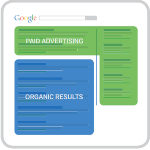 Google AdWords is a fast and simple way to expand the reach of your website. It’s a marketing tool that can offer instant results and huge rewards. It’s also highly measurable which means you can make regular adjustments to your strategy in order to improve your results, as Adrian Bold explains.
Google AdWords is a fast and simple way to expand the reach of your website. It’s a marketing tool that can offer instant results and huge rewards. It’s also highly measurable which means you can make regular adjustments to your strategy in order to improve your results, as Adrian Bold explains.
When users perform an internet search, the results are assessed and ranked, with the closest match appearing higher up the page. This “organic” SEO is based on criteria, including content, headers, page titles, internal links, links back to the site from other reliable websites and much more.
On the search results page there will also be sponsored links on the right-hand side and sometimes at the top of the page. These adverts are generated through Google AdWords. Businesses bid on keywords and if they win they appear higher up the page, giving their website maximum exposure.
Advertising in this way allows you to connect with customers at the moment they are searching for a product or service. You only pay when a customer clicks through your site (known as pay-per-click or PPC). So assuming your advert and keywords accurately represent your business, you can obtain prospects that can be converted into sign ups, sales, or whatever result your campaign was created to achieve.
Google AdWords provides you with full control and the ability to manage and measure your campaigns. It’s more versatile than a print ad; rather than paying for it to be seen by everybody that buys a newspaper, you only need to pay for relevant customers to see it.
The benefit of Google AdWords is that you can test a campaign and then analyse the results so you can make informed adjustments. You aren't tied into a lengthy agreement and there is no minimum spend, so you can start your campaigns small as you learn the skills.
Bidding and keyword selection
It’s advisable to use automatic bidding when you’re starting out to keep the process as simple as possible. It’s easy to keep control of your investment as you can set a maximum daily budget for your campaign. You can also set a maximum cost-per-click (CPC) rate to prevent the system from spending more than you want per keyword.
Your keywords can be researched using an online tool such as Google’s own free keyword tool. You should refine and organise your keywords into tightly themed groups and they should each have different bids, advert copy and landing pages. This makes tracking the results easier and also means you won’t be competing against yourself with keyword bids.
It’s important to try out your keywords by doing searches yourself. See if your competitors are using Google AdWords. If you run a hotel in London you will have thousands of competitors, so this means being more creative with your keywords. What is your Unique Selling Point (USP) — which words make your business stand out from the crowd? If there aren’t any adverts appearing when you do a keyword search it means you’ll be able to snag the top spot for a lower cost, and it means your click-through-rate (CTR) will be higher as you’ve chosen specific keywords relevant to your business.
Consumers search for products and services, so avoid using your company name in your ad title unless your goal is brand awareness. As with any advertising, it’s important to make your ad distinctive, so highlight what makes your business better than the rest — special offers and promotions are a great way to draw traffic to your site.
Whilst your bid influences the position of your ad on the page, AdWords also rewards you for writing relevant ads, so if your CTR is high then you may appear above another ad that has bid more than you for a keyword. This means the more skilled you become at producing successful campaigns, the less your future campaigns will cost.
 As your confidence grows, keep expanding your campaigns by adding new ad groups using a wider variety of keywords. There are lots of professional solutions to help you with keyword selection.
As your confidence grows, keep expanding your campaigns by adding new ad groups using a wider variety of keywords. There are lots of professional solutions to help you with keyword selection.
Experimenting with pay-per-click advertising
Google has a free tool to help you monitor and evaluate your campaign. With conversion tracking you can see what happens after a user has clicked through to your website. You can monitor which words led the consumer to take your desired action.
For instance, if the objective of your online advertising is to improve your e-marketing database, then you could set your website up to track customers at the point when the “thank you for signing up to receive our e-newsletter” page is generated.
You will clearly be able to see whether keyword #1 or keyword #2 was the most effective at getting customers to sign up to your mailing list. You can then tweak your campaign to focus more on the best-performing keyword that will give you a greater return from your investment.
PPC display options
When you set up a Google AdWords account, you will be asked if you want to place your ads on the Display Network. This is another route to advertise your business, and it’s very different from a sponsored link that appears on a search results page.
If you chose to advertise on the Display Network it means your ad will be placed on sites owned by Google and its partners. The sites chosen would be relevant to your market.
For instance, if you ran an online shop selling DIY products your ad might appear on a DIY forum website. The visitors to the forum may be your target market, but they may just be looking for DIY advice when they visit the site. This means they will only click through your advert if they are given a compelling reason to do so. You have the option to manage your own display placement using Google’s placement tool, or let Google decide where to place the ads for you.
Initially, it’s a good idea to turn off the option to appear on the Google Display Network. Start by mastering the Google Search and Google Search Partners before branching out and expanding your advertising. As you gain more experience you can use Display Network ads if you feel they are relevant to your online marketing strategy, although create a separate campaign if you decide to try this; remember they require a very different approach.
Google and internet advertising
Google is continuing to roll out ways to dominate the online advertising industry and this is only going to expand. With its new "bid-per-call" system (which is aimed at businesses that still receive a high volume of leads through phone calls), and the roll out of Google+ earlier this year, Google is constantly evolving and refining the ways that your business can invest in cost-effective advertising.
If you have a website and you want to reach new customers, then Google AdWords offers an immediate solution. Have a go yourself, or speak to an expert, and start to increase your web traffic instantly.











